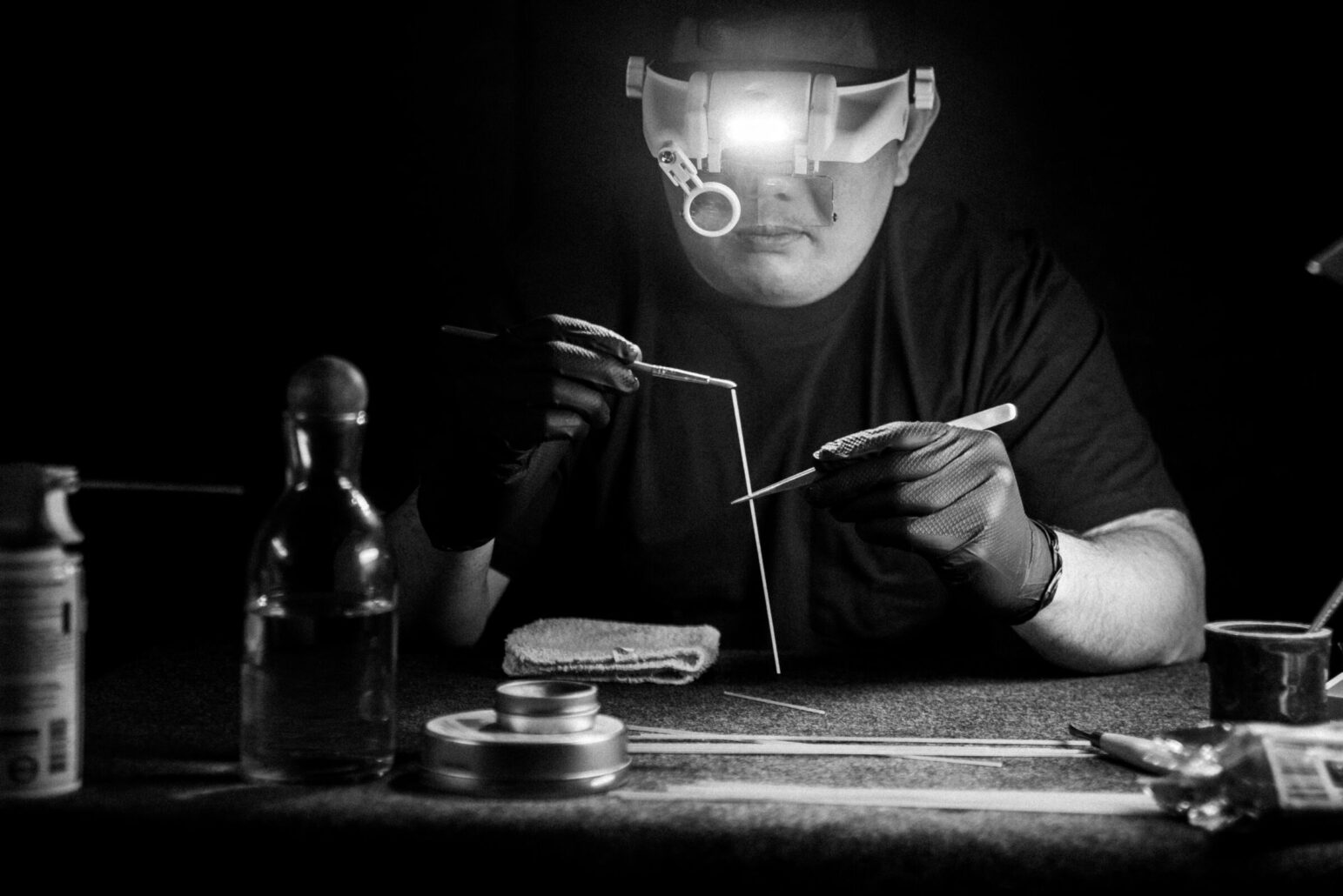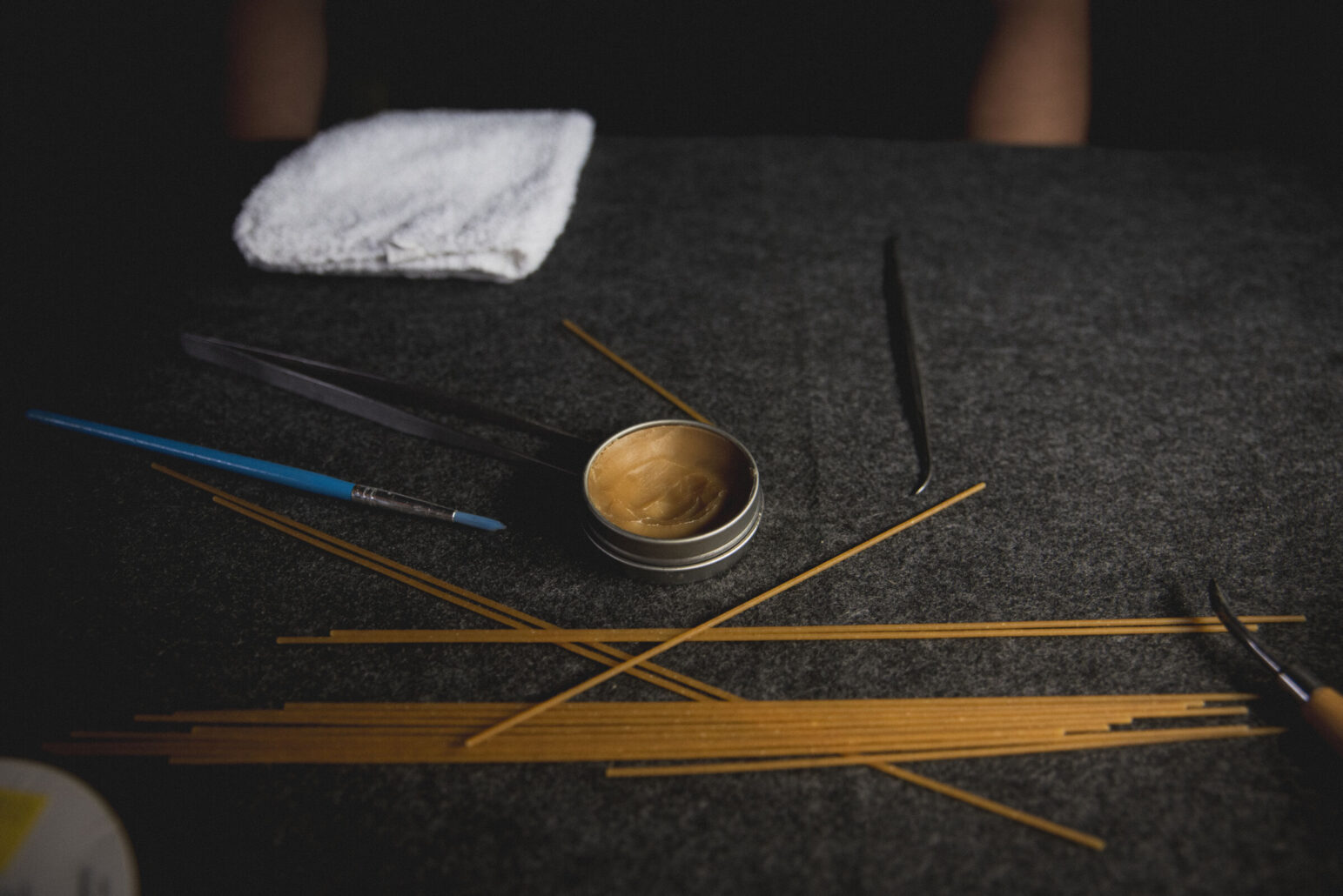A long form article about a recent, fascinating Fidelis client – “the only multi-generational trust funded philanthropic spaghetti repair operation that’s ever existed or will ever exist on this planet”

The young man drooped over, elbows on knees, as he eyed the cigarette nearing its terminus at the orange-brown filter perched in his left hand. He exhaled, and without making contact, he continued. ‘The biggest problem with spaghetti lancets, and I’m sure I’m not telling you anything, Dan, is that they’re brittle. You pack a hundred of them into the cellophane wrappers or little paper board boxes – there’s gonna be product damage. I see thousands of broken lancets move through this shop every day. Chips and dings. Complete fractures.’ He coughs, ‘Had a shipment in from Cleveland last week – looked like a pine forest floor; bits and pieces were everywhere. Goddamn-mess-like-you’ve-never-seen. An explosion.’ He looked up and smiled. ‘But…no complaints, those kinds of disasters keep me in business.’
The young man in front of me, Pedro, couldn’t have been 30 years old, it was hard to tell, though. He clocks 10-hour days in his sole proprietor (just outside) downtown Houston warehouse, a small sign is the only indication of what exactly goes on inside: Javier Spaghetti Repair. It’s a very dark interior. He’s the only employee. He says he has an owner’s mentality because – he owns it. He owns the only spaghetti repair shop remaining in the US. The business came down to him honestly. It’s a legacy shop. He owns a multi-generational food repair business started by his grandfather Javier in 1952. His father, George, took over the reins in 1977, but it landed in Pedro’s lap after his father, George, passed from pneumonia in January 2021. I asked Pedro about his predecessors.
“2021 was tough. I’d been apprenticing until 2017 – when my pop asked me to take over the operation. He provided the much-needed oversight and worked on the pookie.’
‘Wait, the ‘pookie‘?’ I had to ask.
Pedro smiled, ‘The food grade adhesive – for the lancets. It’s a family secret. We mix it first thing every morning. It came over with my grandpa when he landed fresh from Oaxaca.

I nod like I understand. I ask questions as though any of this is normal. I smile like I’m playing along – as though this is a world where there is any market demand of any size whatsoever for ‘repaired’ flour and water composition spaghetti noodles anyone can buy for $1.35 per 16 oz package at the grocery store.
“And why do you keep calling them ‘lancets’ when you’re clearly talking about ‘noodles’ – about spaghetti noodles?’ I was easing into the enormous pile of questions I’d compiled on my flight to Houston to interview this strange, mystifying operation.
‘Industry term,’ he answered, ‘noodles can be anything, Dan – the base for pad thai, dumplings, ramen, tortellini, we’ve seen people call gnocchi ‘noodles’ if you can believe it. Morons.’ Pedro glances at his cell phone but keeps talking, ‘The industry had to get more specific, more granular than the catch-all phrase that means everything and thus…means nothing.’
It’s getting hot, so Pedro nods to the door. We move through a dungeon-like corridor and my eyes struggle to adapt. As I follow him in, I trip a bit on a random bucket lid on my way to the assembly desk under the spotlight. He apologizes, but I’m fine and still on the hunt for answers. I lob another question to try and get movement, ‘Right, you mean the food repair industry?’
‘Yeah, NAFRA (North American Food Repair Alliance). There are only two companies that show up to the annual anymore: a donut repair shop outta San Bernadino and a fruit repair operation somewhere in Florida. Anyway, as I was saying – this stuff was all handed down to me, man. These guys who went before me gave me everything they had – they taught me about flip fractures, protein striations, and end-cap star formations. I didn’t have a clue about any of this when I started and they were working with the good stuff back then, the old world spaghetti, the old stock, the four-ingredient models – not this low-grade crap the manufacturing plants are slinging on shelves these days. Take a look at this tripe.’
Pedro tosses me a box. I catch it…barely. ‘Read it. What’s in that box?’
I tilt the box down to the desk light. ‘Semolina (Wheat), Durum Wheat Flour. Vitamins/Minerals: Vitamin B3 (Niacin), Iron (Ferrous Sulfate), Vitamin B1 (Thiamine Mononitrate), Vitamin B2 (Riboflavin), and Folic Acid.’
‘That’s alien shit, right there.’ He laughs, ‘You don’t mind if I get back to it, right? I can keep talking, but I’m backed up already.’
‘Sure. So what’s in non-alien-shit spaghetti – or the ‘old stock’ you mentioned?’
Pedro is picking up speed – his hands fly around with tweezers and adhesive (the pookie) – the lancets seem to ‘cure’ under a specific blue hue light. ‘Flour. Eggs. Olive oil. Salt.’ He pauses for a few seconds. ‘That’s four.’ He continues, ‘Do you really care?’
“Yes, of course, I wouldn’t ask otherwise,’ I shot back. He took a call and I began to realize that the more he talked, the more questions were multiplying, not shrinking. Pedro ended his phone call and opened a new box of noodles. “Where were we?” he asked.
“Pedro, I think I understand this much: you run a dinosaur business that seems impossible in this century – in almost any century for that matter – fixing a low-cost, low-grade consumer food product. Your customers are …who- the public? You serve mass-market consumers from a different point of sale? I mean, who is paying for this, why are they paying for this, what are you charging for this, geez… the postage and transit alone….?!’ The questions were flowing now. I couldn’t have been more confused and that was obvious. Pedro never looked up, he continued to dab ‘pookie’ on pieces of the lancets and filled in the barely noticeable chips and divots. He was quiet and unbothered, so I continued, ‘There just can’t be real demand for this – for your ‘art’ or the ‘old ways’ or… help me out, here? This isn’t possible. The whole category of ‘food repair’ is, forgive me, preposterous!’ Pedro worked quietly.
Finally, he began to speak quietly.
‘Why did you come here, Dan?’ he asked.
“I told you on the phone. I read an article in the Boston Tribune that mentioned Javier in a piece spotlighting the 10 craziest businesses in America.’ I left it at that.
“Yeah, but nobody from Boston drove down here to talk to me. You’re the first. Why?” Pedro opened another box.
“I just – I wanted to see for myself and I wanted to know if your whole thing – if this is a joke or something. I know it isn’t. I see that now. But I still have no idea how you’re in business.” I doubted very much whether I was going to get a straight answer- he wasn’t giving me anything.
“Javier matters to Alisha, Dan.” He pointed to a framed letter with a little girl’s photo paper clipped to the side. It was a note from a little girl describing how her family in San Antonio had fallen on hard times and in a scribbled hand, she wrote to express her appreciation. “Javier mattered to my ancestors. And whether you’re prepared to hear or not, friend, we need food repair more now than ever. I know our numbers are dwindling, I know that. But, I suppose that you have no idea about what we discard. The United States discards more food than any other country in the world: nearly 120 billion pounds every year, Dan. That’s like, what- 40 percent of the entire US food supply – that’s 325 pounds of waste per person? Maybe you didn’t know that food is the single largest component taking up space inside US landfills – that’s just 22 percent of municipal solid waste (MSW) – does that seem like a lot? It certainly does to me. All told, the amount of food wasted in America has an approximate value of nearly $218 billion – the equivalent of 130 billion meals.” He dropped his implements on the desk and flipped his magnifier specs up to look me dead in the eye.
“So, you tell me, Dan – do you think Javier Spaghetti Repair has a little part to play in this ever-maddening world? Does Javier get to take up space in this globalized, mechanized, industrial wood-chipper of a civilization – America in the 21st century? I think we do.” Pedro cleared his throat and brought his voice even lower. “I know we do.”
“That’s just it. There is no ‘we.’ There’s just you, Pedro. I know you think this is important work. I can match you there – sure. But I don’t know how the market can justify the existence of Javier. This place can’t possibly generate enough revenue to stay in business -or come close to turning a profit. It just…it can’t…what am I not seeing, Pedro? What was last year’s revenue?”
“I have no idea.” Pedro sat expressionless.
“You have no idea?” I whispered.
“No. I don’t actually charge for the work.”
“Keep going,” I couldn’t believe what I was hearing.
“I have a great uncle. He handles everything. The building is paid for – it’s in a trust. My Tio takes care of all the rest – I just fix spaghetti.”
“Keep going, Pedro” I raised my voice a bit and was more forceful. We were finally getting somewhere.
“My grandfather’s family had purchased some stock in the 1950’s and they set him up. Some of that money bought more stock in the 1970’s and it did relatively well – and then he bought Apple shares in 1994. Like – he says he bought so many shares of Apple in 1994. Those were some great moves. That’s what keeps this thing going – keeps us doing what we love. I’ve got a girl, Anna Marie in Dallas, we’ll get married soon enough and I’ll have a kid and he’ll keep the thing running. It’s in the blood, Dan.”
“It’s in the blood…(I shook my head) and what’s in the pookie, Pedro?”
“Now that’s a family secret. We have a few, you know.”
“Does your Tio even charge for the work?”
“I don’t know. I don’t think so.” He looked back down at the desk. His hands jumped toward the tweezers and he clicked his specs back down to meet the bridge of his nose. “Does that answer all your questions? Is that enough for your article?”
“My article? Yes. I think it is. I’ve had just about enough of all of it. I just discovered the only multi-generational trust funded philanthropic spaghetti repair operation that’s ever existed or will ever exist on this planet. It’s entirely too bizarre to be remotely true.”

04/01/2025
Do you need help
talking to your
perfect clients?